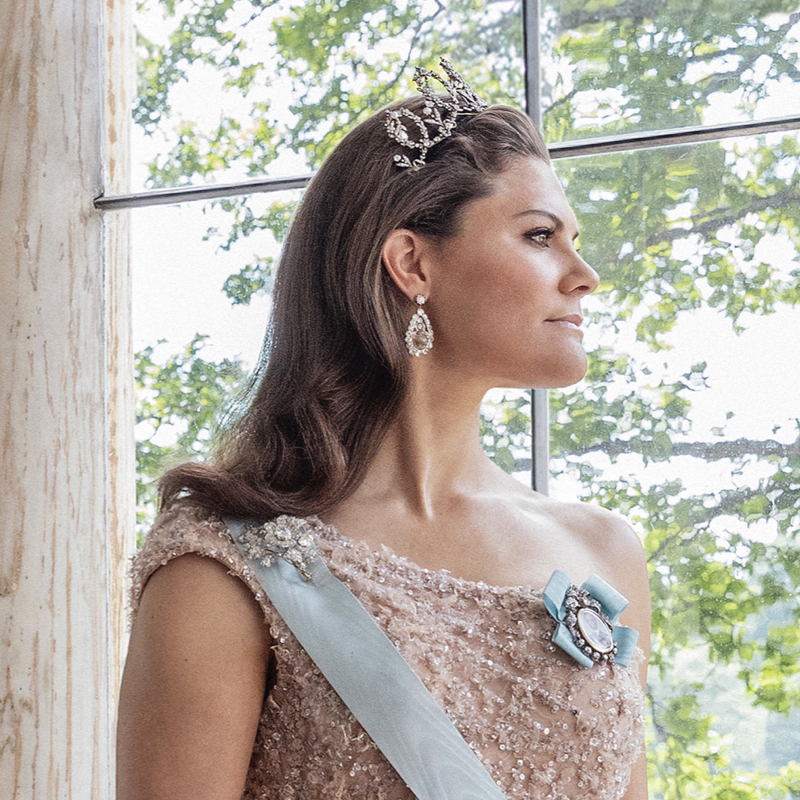If you have always wanted to wear a sparkling headpiece, the new official portraits the Swedish Royal Court released to celebrate the 10th wedding anniversary of Crown Princess Victoria and Prince Daniel are the perfect example of how to wear a tiara.
Of all the jewellery pieces a woman can wear, the tiara is by far the most glamorous. In fact, the head ornament is so dazzling that it is only worn on special occasions, and even so, not by everyone. Believe it or not, there is a tiara etiquette with strict rules that royals follow before wearing their sparking accessory. Keep reading to find out when and how to wear a tiara.
Where do tiaras come from?
The origins of the tiara as we know it can be traced back to the ancient Greeks’ diadem that was worn by the rulers as a symbol of power, and by warriors and athletes, to honour their victories. As for the name, the word tiara originates from the Persian Empire, meaning “wrapped around the head”. In the beginning, crown-shaped jewels were worn by brides of all ranks, but it wasn’t until the 18th century that tiaras became a jewellery trend.
Are tiaras and crowns the same?
Although both head ornaments are part of the royal attire, there are several differences between the two. Firstly, the crown represents the sovereignty of a king or queen. It means, a man or a woman can wear a crown, but only if they are rulers, whereas a tiara is only worn by women and you don’t have to be a queen to wear one. Secondly, a tiara is semi-circular while a crown has a complete circular base and usually looks the same from all angles. Finally, crowns are normally bigger and taller than tiaras, containing some of the most famous gems in the world like, for example, the 105-carat Koh-i-Noor diamond on Queen Elizabeth’s crown.
Can anyone wear a tiara?
Historically, fathers give a tiara to their daughters on the wedding day. It is a rite of passage, and the jewel is the crowning of love but also symbolises the loss of innocence. Once married, women can wear tiaras to all black-tie events. Not very fun for unmarried women, who were considered spinsters in the past, and would be the only ones not showing off proudly their fabulous tiaras at balls. But, as in every rule, there is an exception to it. A woman who is born into the Royal Family with the title of princess, like the cute Charlotte, daughter of Prince William and Kate Middleton for example, can wear tiaras even when single, but she will have to wait until she turns 18 for that.
Do you have to be a Princess to wear a tiara?
Tiaras denote wealth and status and are usually worn by royalty and those marrying into royal families, like Meghan Markle and Queen Maxima of the Netherlands. But they are more and more popular among women who love to sparkle on special occasions. After all, tiaras are jewellery pieces and as such, can adorn the heads of all women, princesses or not. So nowadays, it is not so much about ranks but more a question of knowing if the occasion is appropriate or not to wear a tiara.
When can you wear a tiara?
As mentioned before, tiaras are usually worn for weddings and black-tie occasions such as balls, royal dinners, state visits, inaugurations and coronations. As with diamonds, tiaras are typically reserved for affairs happening after sunset or at the earliest, after 5 pm. Unless it’s a morning wedding, of course.
How to hold it in place?
First of all, you must know where to place your sparkling head accessory. The tiara must be placed around 2,5 cm from your hairline. You can wear it with your hair up or down, as long as you pull the sides back to cover the ends of the tiara so as to hide them. For extra grip, have the tiara sewn into a piece of hair braided or an elastic band holding it in place. In this case, the band must be tucked into the hairdo.
Choosing a tiara
Whether you prefer a vintage jewel, a family heirloom or a modern one, you should take into consideration the shape of your face before choosing a tiara. If you have a round face, wear a pointy headpiece that will elongate it. On the other hand, go for a rounder tiara if you have a long and thin face. Also, pay attention to the velvet band that covers the base of your head jewel; make sure the colour of the velvet matches the colour of your hair.
Last important tip
Make sure to place the bejewelled accessory on your head only after the hair-spraying is done; you don’t want to wear a sticky tiara.
Title photo by Elisabeth Toll. Courtesy of Royal Court of Sweden.
